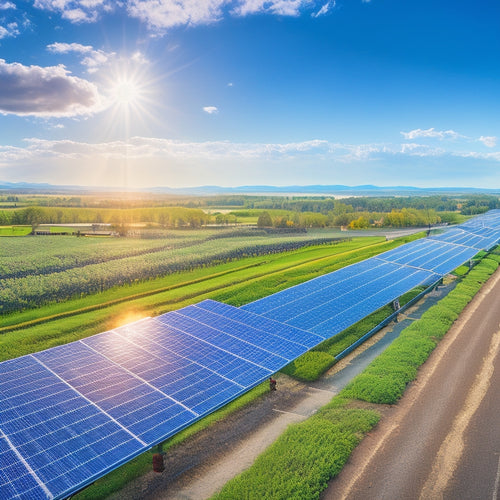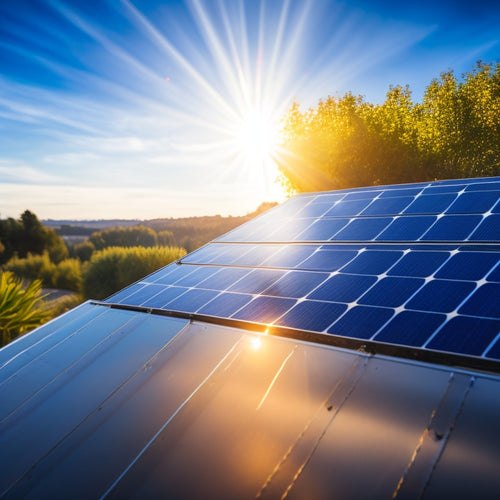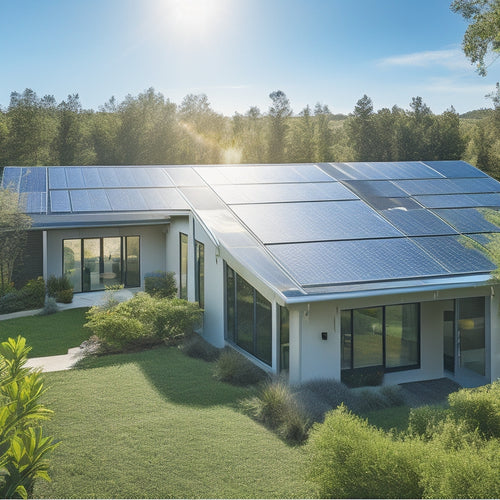
Get Solar Panels Installed
Share
By getting solar panels installed, you'll start saving money on your energy bills right away, with the potential to eliminate them entirely. Your property value will also increase, appealing to eco-conscious buyers and giving you a significant edge in the market. To maximize energy production, it's essential to assess your roof's shading, orientation, and pitch, as well as the ideal placement and tilt of your panels. With the right system in place, you'll be utilizing maximum energy from the sun and taking a step towards a cleaner, more sustainable future - and there's even more to investigate when it comes to optimizing your solar panel installation.
The Essentials
- Investing in solar panels can eliminate energy bills entirely, reducing carbon footprint and providing cost savings through net metering and federal tax credits.
- A well-designed solar panel system can increase property value by up to 17%, attracting eco-conscious buyers and enhancing home equity.
- Optimal panel placement is crucial, considering factors like roof size, orientation, and shading to maximize energy harvesting potential and reduce losses.
- Energy storage solutions can store excess energy generated during the day, allowing homeowners to maximize savings during off-peak hours and achieve energy independence.
- Professional installation and assessment of roof orientation, pitch, and shading patterns are essential for optimal solar panel performance and energy efficiency.
Zero Energy Bills Guaranteed
By investing in solar panels, you'll start saving money monthly on your energy bills.
With a well-designed system, you can eliminate energy costs entirely, freeing up more of your budget for other expenses.
By embracing a cleaner, more sustainable future with Renewable Energy Solutions, you'll not only reduce your carbon footprint but also reap significant cost savings.
You can say goodbye to rising electricity rates and hello to predictable, low-cost energy.
Save Money Monthly
Your electricity meter will actually start running backward once you've installed solar panels on your roof, thanks to the excess energy they produce. This means you'll be generating more electricity than you're consuming, and that's when the savings kick in.
By integrating your solar panels with a reliable home battery storage solution, you'll be able to store excess energy and use it during off-peak hours or emergencies, maximizing your solar panel investment and reducing your reliance on the grid.
With solar panels, you can greatly reduce your monthly electricity bills, and in some cases, even eliminate them altogether.
You'll start enjoying monthly savings from day one, and the benefits only get better over time. The more electricity your solar panels produce, the more you'll save on your energy bills.
Plus, you'll be taking advantage of solar incentives, such as net metering, which allows you to sell excess energy back to the grid and offset your energy costs.
By going solar, you'll be locking in low energy rates for years to come, protecting yourself from rising energy costs and inflation.
With solar panels, you'll be in control of your energy usage and expenses, giving you the freedom to allocate your hard-earned money towards more important things.
Eliminate Energy Costs
One of the most significant advantages of going solar is the potential to completely eliminate energy costs. With a solar panel system that matches your energy needs, you can generate enough electricity to power your home or business, reducing your reliance on the grid. This means you'll no longer have to worry about rising energy bills or price hikes.
By investing in residential solar energy, you'll not only reduce your energy costs but also increase your home's value and appeal.
By going solar, you'll enjoy energy independence and save money in the long run. With solar incentives like the federal solar investment tax credit, you can also claim a significant portion of your installation costs back as a credit on your taxes.
Plus, many utilities offer net metering programs, which allow you to sell excess energy back to the grid and offset your energy costs.
Imagine having zero energy bills guaranteed – it's a reality with solar power. You'll have the freedom to use your energy savings for more important things, like investing in your business or enjoying your personal life.
With energy independence, you'll be in control of your energy costs, not the other way around.
Increases Property Value Fast
By installing solar panels, you'll not only reduce your electricity bill and carbon footprint with renewable energy, but you'll also enhance your property's resale value and attract potential buyers who are willing to pay a premium for eco-friendly homes home solar panels cost.
This increase in value adds to your home equity, providing a tangible return on your investment.
As a result, you'll benefit from a higher selling price and a faster sale when you decide to put your property on the market.
Boosts Resale Value
Installing solar panels can increase your property value by up to 17% according to a National Renewable Energy Laboratory study. This significant enhancement in resale value is a major advantage of going solar. As you consider installing solar panels, keep in mind that it's not just about reducing your energy bills - it's also about making a smart investment in your property.
| Solar Panel Feature | Resale Value Impact |
|---|---|
| Energy Efficiency | Increases property value by 10-15% |
| Environmental Benefits | Appeals to environmentally conscious homebuyers |
| Low Maintenance | Reduces concerns about future maintenance costs |
In today's solar market trends, homebuyers are increasingly looking for properties with sustainable features. By installing solar panels, you're catering to these homebuyer preferences and setting your property apart from others on the market. This can lead to a faster sale and a higher selling price. With solar panels, you're not only reducing your carbon footprint but also making a savvy investment in your property's resale value.
Adds Home Equity
In addition to enhancing resale value, going solar also allows you to utilize the benefits of increased home equity. By installing solar panels, you're making a smart home improvement that not only reduces your carbon footprint but also raises your property's value.
According to the National Renewable Energy Laboratory, solar panels can increase your home's value by up to $15,000. This significant enhancement in home equity can provide you with a sense of financial freedom and security.
As a homeowner, you can capitalize on this increased equity to secure better loan options or access more credit. Furthermore, going solar is a sustainable living choice that reduces your reliance on the grid and lowers your energy bills.
With solar panels, you're investing in a cleaner, more sustainable future for yourself and your community. By increasing your home's value and equity, you're taking a significant step towards achieving financial freedom and independence.
Maximum Energy Harvesting Potential
When you install solar panels, you'll want to maximize your energy harvesting potential.
To do this, you'll need to evaluate ideal panel placement, factoring in elements like roof size, orientation, and shading.
For instance, a residential solar system should be installed in a way that minimizes energy loss due to shading from trees or other obstructions.
Optimal Panel Placement
To maximize your solar panel system's energy output, you'll want to position the panels in a way that captures the most sunlight possible. This means considering factors like panel alignment and roof type.
For ideal energy harvesting, your solar panels should face directly at the sun, with an ideal tilt angle between 30 and 40 degrees. However, the exact angle may vary depending on your location and roof type.
If you have a flat roof, you'll have more flexibility regarding panel alignment. But if you have a pitched roof, you'll need to adjust the panel angle to match the roof's slope.
Additionally, you should avoid installing panels in areas with shade, as this can greatly reduce energy output.
Energy Efficiency Boost
By strategically positioning your solar panels, you can release their full energy harvesting potential. This is essential in maximizing the energy output of your solar panel system.
With recent solar technology advancements, you can now enhance energy production and reduce energy losses.
To achieve this, consider the following factors: panel tilt, orientation, and shading. Confirm your panels are installed at an ideal angle, facing the correct direction, and aren't obstructed by trees or buildings. This will enable you to generate the most electricity possible from the sun's rays.
Furthermore, incorporating energy storage solutions into your system can help you store excess energy generated during the day for use during the night or on cloudy days. This will provide you with a reliable source of clean energy and reduce your reliance on the grid.
Assess Your Roof's Shading
You'll need to take into account your roof's orientation, as a south-facing roof receives the most sunlight throughout the day.
In addition, it's vital to evaluate the compatibility of your roof with residential solar panels and assess the energy efficiency solutions that can be implemented.
However, shading patterns vary depending on the time of day, season, and surrounding structures, so it's important to assess these factors.
Roof Orientation Matters
The orientation of your roof plays an essential role in determining the effectiveness of your solar panel system. When evaluating your roof's orientation, you'll want to take into account the roof pitch, which is the angle at which your roof slopes. A roof pitch between 15 and 40 degrees is ideal for solar panels, as it allows for maximum energy production.
You'll also need to take into account the solar azimuth, which is the direction your roof faces. In the northern hemisphere, a south-facing roof is ideal, as it receives the most direct sunlight throughout the day. East- and west-facing roofs can also work well, but north-facing roofs typically receive too little sunlight to be effective.
When evaluating your roof's orientation, keep in mind that even small obstructions, such as vents or skylights, can impact the performance of your solar panel system.
A professional solar installer can evaluate your roof's orientation and provide guidance on the best placement for your solar panels. By taking these factors into account, you can maximize the energy-producing potential of your solar panel system and enjoy the freedom that comes with generating your own clean energy.
Shading Patterns Vary
Solar panels can't produce energy if they're constantly shaded, so it's crucial to assess your roof's shading patterns before installation. You'll want to identify areas where trees, buildings, or other structures cast shadows on your roof, as these will impact your solar panel system's performance.
A thorough shading analysis will help you determine the best shading design for your unique situation.
Shading impacts your energy production, but it's not a deal-breaker. With advanced shading technology, you can optimize your system's performance even in partially shaded areas.
Your solar panel installer will use specialized software to analyze your roof's shading patterns and provide shading solutions customized to your needs.
By taking shading into account, you can make certain your system operates at peak efficiency, maximizing your energy output and reducing your reliance on the grid.
Don't let shading obstacles stand in the way of your freedom to generate clean, renewable energy – work with a knowledgeable installer to overcome them.
Higher Energy Conversion Rate
You're likely looking for solar panels that can generate the maximum power output from the sunlight they receive.
A higher energy conversion rate guarantees you get the most out of your solar panel system.
Maximum Power Output
Maximum power output, measured in watts (W), is vital for getting the most out of your solar panel system, as it directly affects your energy conversion rate. A higher maximum power output means you'll generate more electricity from the same amount of sunlight, resulting in increased energy production.
When shopping for solar panels, look for ones with high solar efficiency ratings, as these will produce more power per unit area.
You'll want to take into account the maximum power output of each panel, as well as the overall system, to guarantee you're getting the most energy possible. A higher maximum power output also means you'll have more flexibility regarding system design and installation.
For example, you may be able to use fewer panels to achieve the same energy output, which can save you money on installation costs.
Frequently Asked Questions
Can I Install Solar Panels on a Rented Property?
You'll typically need your landlord's approval before installing solar panels on a rented property, as it's their asset. Review your rental agreements to see if there are any provisions or restrictions on making modifications to the property.
How Long Does the Solar Panel Installation Process Take?
As you commence on an expedition to utilize the sun's power, you're keen to know how long it'll take to reach your destination. The installation timeline varies, but typically takes 1-3 months, depending on installation factors like permit approvals and roof complexity.
Are Solar Panels Resistant to Extreme Weather Conditions?
You'll be pleased to know that solar panels are designed to withstand extreme weather conditions, ensuring their durability; they're built to resist harsh weather effects, such as hail, high winds, and heavy snow, giving you peace of mind.
Can I DIY Solar Panel Installation to Save Money?
You're considering DIY solar panel installation to save on cost, but be aware that you'll face installation challenges, like ensuring electrical connections and waterproofing, which could outweigh potential cost savings if not done correctly.
Do Solar Panels Void My Roof's Warranty?
You're wondering if solar panels will void your roof's warranty; the answer depends on the manufacturer's terms. Typically, warranties remain intact if you follow proper installation and solar panel maintenance, ensuring your roof's integrity isn't compromised.
Final Thoughts
You'll be swimming in savings when you get solar panels installed! With zero energy bills guaranteed, you'll be pocketing the cash you used to fork out to the utility company. Your property value will skyrocket, and with maximum energy harvesting potential, you'll be producing power like a pro. Our expert assessment will pinpoint any shading issues on your roof, ensuring a higher energy conversion rate. The result? A bottom line that's off the charts!
Related Posts
-

Applications of Photovoltaic Systems
Photovoltaic systems are versatile, converting sunlight into electricity for various applications. You can use them i...
-

How Efficient Are Thin Film Solar Cells
Thin film solar cells provide an innovative approach to energy generation, boasting efficiency rates generally betwee...
-

Installing Metal Solar Roofs for Maximum Energy Efficiency
Installing metal solar roofs can drastically enhance your home's energy efficiency and durability. These roofs withst...


